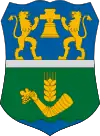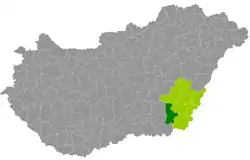Orosháza District
Orosháza (Hungarian: Orosházi járás) is a district in south-western part of Békés County. Orosháza is also the name of the town where the district seat is found. The district is located in the Southern Great Plain Statistical Region.
Orosháza District
Orosházi járás | |
|---|---|
 Coat of arms | |
 Orosháza District within Hungary and Békés County. | |
| Country | |
| County | Békés |
| District seat | Orosháza |
| Area | |
| • Total | 717.18 km2 (276.90 sq mi) |
| Area rank | 2nd in Békés |
| Population (2011 census) | |
| • Total | 51,482 |
| • Rank | 2nd in Békés |
| • Density | 72/km2 (190/sq mi) |
Geography
Orosháza District borders with Szarvas District to the north, Békéscsaba District and Mezőkovácsháza District to the east, Makó District (Csongrád County) to the south, Hódmezővásárhely District and Szentes District (Csongrád County) to the west. The number of the inhabited places in Orosháza District is 8.
Municipalities
The district has 2 towns, 2 large villages and 4 villages. (ordered by population, as of 1 January 2012)[1]
- Békéssámson (2,318)
- Csanádapáca (2,617)
- Gádoros (3,555)
- Kardoskút (885)
- Nagyszénás (5,070)
- Orosháza (28,910) – district seat
- Pusztaföldvár (1,700)
- Tótkomlós (5,780)
The bolded municipalities are cities, italics municipalities are large villages.
Demographics
Religion in Orosháza District (2011 census)
In 2011, it had a population of 51,482 and the population density was 72/km².
| Year | County population[2] | Change |
|---|---|---|
| 2011 | 51,482 | n/a |
Ethnicity
Besides the Hungarian majority, the main minorities are the Slovak (approx. 1,500), Roma (650), German (250) and Romanian (150).
Total population (2011 census): 51,482
Ethnic groups (2011 census):[3] Identified themselves: 45,712 persons:
- Hungarians: 42,825 (93.68%)
- Slovaks: 1,460 (3.19%)
- Gypsies: 645 (1.41%)
- Others and indefinable: 782 (1.71%)
Approx. 6,000 persons in Orosháza District did not declare their ethnic group at the 2011 census.
Religion
Religious adherence in the county according to 2011 census:[4]
- Catholic – 10,548 (Roman Catholic – 10,469; Greek Catholic – 77);
- Evangelical – 6,958;
- Reformed – 2,329;
- other religions – 920;
- Non-religious – 16,045;
- Atheism – 654;
- Undeclared – 14,028.
Gallery
_-_Orosh%C3%A1za%252C_Gy%C5%91ri_Vilmos_t%C3%A9r.jpg.webp) Orosháza, the biggest Hungarian village
Orosháza, the biggest Hungarian village Aerial view of Tótkomlós
Aerial view of Tótkomlós Landscape near Nagyszénás
Landscape near Nagyszénás Downtown of Orosháza
Downtown of Orosháza Spa in Gyopárosfürdő (Orosháza)
Spa in Gyopárosfürdő (Orosháza) Turkish bridge near Békéssámson
Turkish bridge near Békéssámson
See also
References
- A KSH 2012. évi helységnévkönyve
- népesség.com, "Orosházi járás népessége"
- 4.1.6.1 A népesség nemzetiség szerint, 2011, (in Hungarian)
- 4.1.7.1 A népesség vallás, felekezet szerint, 2011, (in Hungarian)